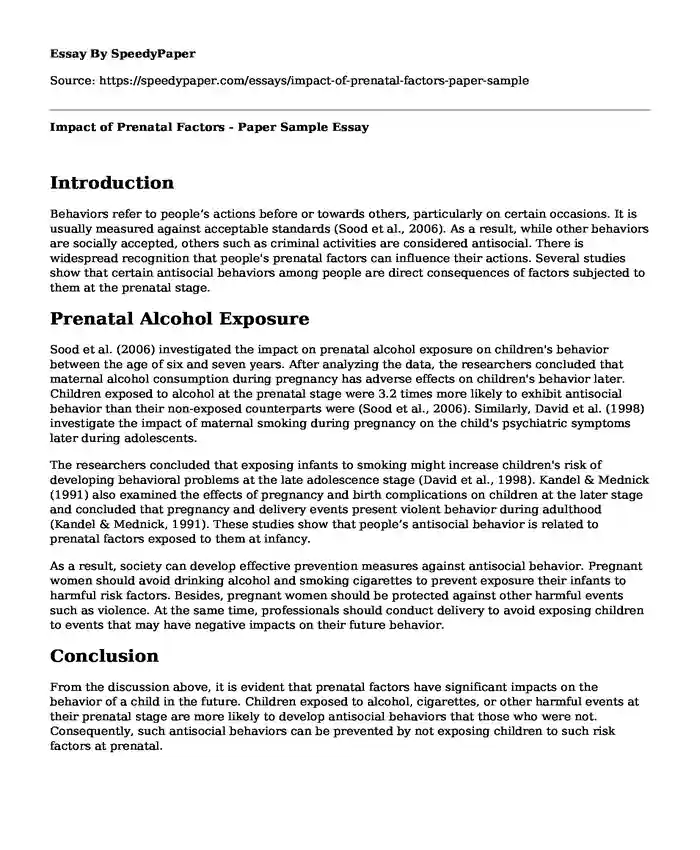Introduction
Behaviors refer to people’s actions before or towards others, particularly on certain occasions. It is usually measured against acceptable standards (Sood et al., 2006). As a result, while other behaviors are socially accepted, others such as criminal activities are considered antisocial. There is widespread recognition that people's prenatal factors can influence their actions. Several studies show that certain antisocial behaviors among people are direct consequences of factors subjected to them at the prenatal stage.
Prenatal Alcohol Exposure
Sood et al. (2006) investigated the impact on prenatal alcohol exposure on children's behavior between the age of six and seven years. After analyzing the data, the researchers concluded that maternal alcohol consumption during pregnancy has adverse effects on children's behavior later. Children exposed to alcohol at the prenatal stage were 3.2 times more likely to exhibit antisocial behavior than their non-exposed counterparts were (Sood et al., 2006). Similarly, David et al. (1998) investigate the impact of maternal smoking during pregnancy on the child's psychiatric symptoms later during adolescents.
The researchers concluded that exposing infants to smoking might increase children's risk of developing behavioral problems at the late adolescence stage (David et al., 1998). Kandel & Mednick (1991) also examined the effects of pregnancy and birth complications on children at the later stage and concluded that pregnancy and delivery events present violent behavior during adulthood (Kandel & Mednick, 1991). These studies show that people’s antisocial behavior is related to prenatal factors exposed to them at infancy.
As a result, society can develop effective prevention measures against antisocial behavior. Pregnant women should avoid drinking alcohol and smoking cigarettes to prevent exposure their infants to harmful risk factors. Besides, pregnant women should be protected against other harmful events such as violence. At the same time, professionals should conduct delivery to avoid exposing children to events that may have negative impacts on their future behavior.
Conclusion
From the discussion above, it is evident that prenatal factors have significant impacts on the behavior of a child in the future. Children exposed to alcohol, cigarettes, or other harmful events at their prenatal stage are more likely to develop antisocial behaviors that those who were not. Consequently, such antisocial behaviors can be prevented by not exposing children to such risk factors at prenatal.
References
Fergusson, D., Woodward, L., & Horwood, J. (1998). Maternal smoking during pregnancy and psychiatric adjustment in late adolescence. American Medical Association, 55(1), 721-727.
https://jamanetwork.com/journals/jamapsychiatry/fullarticle/204171
Kandel, E., & Mednick, S. (1991). Perinatal complications predict violent offending. Criminology, 29(3), 157-164.
https://onlinelibrary.wiley.com/doi/abs/10.1111/j.1745-9125.1991.tb01077.x
Sood, B., Delaney-Black, V., Covington, C., Nordstrom, B., Ager, J., Templin, T., Janisse, J., Martier, S., & Sokol, R. (2006). Prenatal alcohol exposure and childhood behavior at age 6 to 7 years: I. Dose-response effect. American Academy of Pediatrics, 8(2), 1-9.
https://pubmed.ncbi.nlm.nih.gov/11483844/.
Cite this page
Impact of Prenatal Factors - Paper Sample. (2023, Dec 25). Retrieved from https://speedypaper.net/essays/impact-of-prenatal-factors-paper-sample
Request Removal
If you are the original author of this essay and no longer wish to have it published on the SpeedyPaper website, please click below to request its removal:
- Conflicts in Organizations and Impact on Organizational Culture - Free Essay in Management
- Free Essay about Hoarding Disorder
- Whistle-blow Research in Our Free Essay
- Epidemiology and Biostatistics Essay Example
- Free Essay: Anonymous Survey on Confinement during the COVID-19 Pandemic
- Patient-Centered Care. Free Essay Example
- Velma Company Organizational Behavior and Reward Systems - Free Paper
Popular categories





